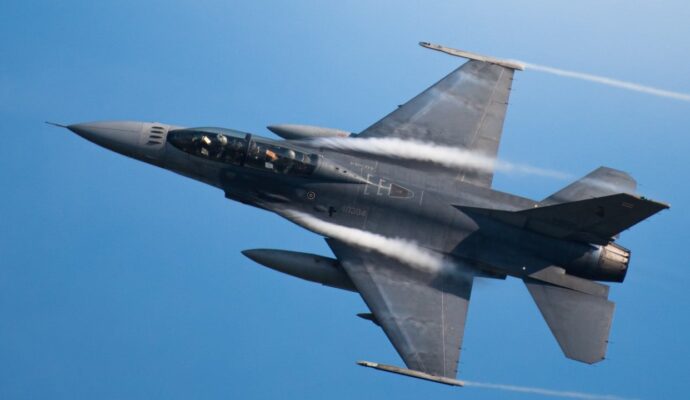China – which has its own ambitions of becoming a “polar great power” by 2030 – has also been gaining a foothold in the region through scientific research and economic ties with the Arctic states, particularly Russia, in recent years.
“We see cooperation with Chinese partners in developing the transit potential of the northern sea route as promising,” said Russian President Vladimir Putin, during a meeting with China’s leader Xi Jinping in March.
“We are ready to create a joint working body for the development of the northern sea route.”
Pavel Devyatkin, a senior associate at the Washington-based think tank Arctic Institute, said more oil flowing from the Russian Arctic to China was “just the latest sign of increasing energy cooperation between the two countries”.
According to Devyatkin, Beijing has been using its scientific and economic ties with Moscow to ramp up its foothold in the region.
“For example, China is active in scientific cooperation, participating in international Arctic research expeditions with scientists of the Arctic states,” he said.
Russia’s partnership with China was further strengthened by the disruption of the Arctic Council, the intergovernmental forum for the region’s governments and indigenous people.
Seven of the council’s eight members – the US, Canada, Finland, Denmark, Iceland, Norway and Sweden – are in an ongoing boycott of its meetings in response to Russia’s invasion of Ukraine.
The growing bitterness between the Arctic Council – which China takes part in as an observer state – and Russia has driven Moscow to increase its ties with Beijing in operations related to the region, experts said.
In September last year, the US Coast Guard encountered Chinese and Russian warships conducting joint operations near Alaska.
And last week, the two countries held a joint naval and air force exercise in the Sea of Japan, or East Sea – a major sea route between China and the Arctic Ocean – aimed at “safeguarding the security of strategic waterways”.
In April, Russia announced plans to develop an international Arctic science station in Norway’s Svalbard islands, in cooperation with China and the other members of BRICS – an association of leading emerging markets – Brazil, India and South Africa.
China is also in the process of “regrouping and reconsidering its Arctic policy”, said Marc Lanteigne, associate professor of political-science at the Arctic University of Norway in Tromsø.
According to Lanteigne, Beijing is trying to support Moscow without alienating the other Arctic governments, but its own relations with some of them have soured in recent years and pushed China’s cooperation with Russia.
“The ability for China to operate in the region has become much more constrained. If the Arctic Council is not able to function properly, China will probably have to make more use of bilateral cooperation with Arctic states,” he said.
“There probably will be more examples of cooperation with Russia … they’re starting to look at other alternatives for cooperation in case the council is not able to function.”
Liselotte Odgaard, a professor at the Norwegian Institute for Defence Studies, said China’s close strategic partnership with Russia in the Arctic region was a “double-edged sword”.
“[China] does have investments across the region in all the Western states, but it has been prevented from making many strategic investments because the Nato countries have increasingly said no to China.”
According to Odgaard, China has entered numerous science and environmental cooperation institutions and observatories and taken part in many multilateral scientific expeditions that are open to countries from outside the region.
But she pointed out that there has been a growing realisation that these resources could also be used for military-strategic purposes, such as situational awareness and intelligence.
“They have benefited hugely from that for many years, but now people are starting to take notice [and] their presence is being discontinued,” Odgaard said.
China’s engagement with Russia and its pursuit of a strategic presence in the Arctic – by attempting to buy or build assets with potential military use – has made European and North American states in the region more wary of Chinese investment.
Beijing has permanent research stations in the Svalbard archipelago and Iceland, supporting a wide range of research in areas such as marine ecology and atmospheric physics.
But in 2019, a third station – built by China in 2016 at Kiruna in northern Sweden to relay images of the Arctic region – came under scrutiny for alleged ties with the People’s Liberation Army, raising concerns it could be used for military intelligence.
The same year, state-run China Communications Construction Company withdrew its bid to build US$420 million worth of airport projects in Greenland amid concern in Denmark over its alliance with the US, which has an airbase in Greenland. In 2017, Copenhagen had turned down an offer from Chinese mining firm General Nice Group to buy an abandoned naval base on Greenland due to security concerns.
In 2018, the Shanghai-based Polar Research Institute, a central government agency that plans and coordinates China’s activities in the region, was thwarted in its bid to buy an airport in Lapland, northern Finland. Helsinki suspended the deal under pressure from Washington.
The institute raised further disquiet in Washington when it announced in June that it was ready to deploy underwater devices on a large scale in the Arctic Ocean for subglacial communication, navigation and positioning.
The US is opposed to the move because of its potential to be used to navigate and hide nuclear submarines under the polar ice.
China’s lack of transparency has repeatedly raised concerns that its scientific research could open the door to military or intelligence activities, said Brian Hart, a fellow with the China Power Project at the Washington-based think tank Centre for Strategic and International Studies.
“The lines between civilian and military can often be blurred when it comes to research, and this is certainly the case for China,” he said.
“This means that even legitimate scientific research can potentially be used by China’s military and intelligence services for non-civilian purposes.”
Hart said China’s strong diplomatic, economic and military relationship with Russia was aimed in part at increasing Chinese influence in the Arctic.
But he added that Moscow was likely to be wary of the extent of Chinese military activities in the Arctic, which Russia considers its strategic backyard, with its most sensitive military assets in operation.
According to Odgaard, from the Norwegian institute, while Beijing is not aiming to become a military power in the Arctic through single-handed operations, it is trying to increase its strategic ties with Moscow by supporting Russia’s presence in the region.
She said China wanted to maintain cooperative relations with Europe but the Western continent was on the “wrong side” of its strategic rivalry with the US.
“For [China], a main priority will be that Russia can continue to threaten Nato, across that line from the Arctic down to the Mediterranean,” Odgaard said.




